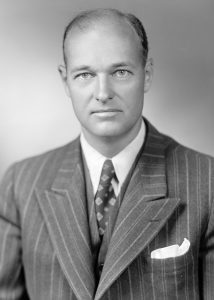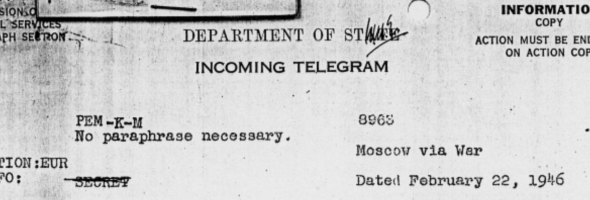
There were few places on earth less pleasant in winter than the Soviet capital; [US Ambassador to the Soviet Union George] Kennan calls the time [spent sick] “these unhappy days,” and associates his five-part telegram with “an eighteenth-century Protestant sermon.” For a year and a half, he wrote thirty years later, still exasperated, “I had done little else but pluck people’s sleeves, trying to make them understand the nature of the phenomenon with which we in the Moscow embassy were daily confronted and which our government and people had to learn to understand if they were to have any chance of coping successfully with the problems of the postwar world. So far as official Washington was concerned, it had been to all intents and purposes like talking to a stone.” Kennan’s mood of exasperation- with the Soviets and with Washington- colored his analysis. In his Memoirs he claims “horrified amusement” at rereading his long telegram and mocks its pretension- “much of it reads exactly like one of those primers put out by alarmed congressional committees or by the Daughters of the American Revolution, designed to arouse the citizenry to the dangers of the Communist conspiracy.” He was evidently in dead earnest at the time.
“The USSR still lives in antagonistic ‘capitalist encirclement,'” Kennan began his analysis ominously, “with which there can be no permanent peaceful coexistence.” He ascribed to the Kremlin a “neurotic view of worlds affairs,” which “at bottom” was the “traditional and instinctive Russian sense of insecurity.” Russian rulers, he said, “have always feared foreign penetration, feared direct contact between [the] Western world and their own, feared what would happen if Russians learned [the] truth about [the] world without or if foreigners learned [the] truth about [the] world within.” Marxism simply supplied “justification for their instinctive fear of [the] outside world, for the dictatorship without which they did not know how to rule, for the cruelties they did not dare not to inflict…” The Soviet rulers were not necessarily insincere; “who, if anyone, in this great land actually receives accurate and unbiased information about [the] outside world” was an “unsolved mystery.” An atmosphere of “Oriental secretiveness and conspiracy” pervaded the government, so that “possibilities for distorting or poisoning sources and currents of information are infinite.”
In consequence, “we have here a political force committed fanatically to the belief that with [the] US there can be no permanent modus vivendi, that it is desirable and necessary that the internal harmony of our society be disrupted, our traditional way of life be destroyed, the international authority of our state be broken, if Soviet power is to be secure.” How to cope with such a country “should be approached with [the] same thoroughness and care as [the] solution of [a] major strategic problem in war.”
Kennan believed the problem could be solved, however. The Soviets were militarily weaker and their system was not necessarily stable. War was not the solution. Rather, for the indefinite future, the Communists would have to be contained:
Soviet power, unlike that of Hitlerite Germany, is neither schematic nor adventuristic. It does not work by fixed plans. It does not take unnecessary risks. Impervious to the logic of reason, it is highly sensitive to the logic of force. For this reason it can easily withdraw- and usually does- when strong resistance is encountered at any point. Thus, if the adversary has sufficient force and makes clear his readiness to use it, he rarely has to do so.

